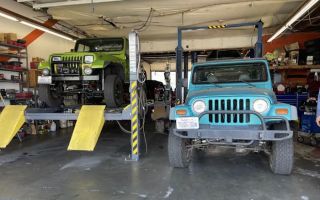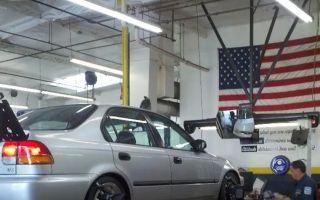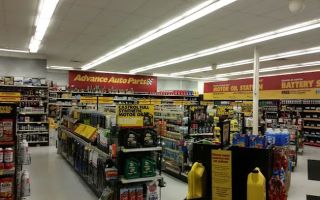Troubleshooting and Repairing Car HVAC System Failures
As a car owner, I’ve had my fair share of frustrating moments when the HVAC (Heating, Ventilation, and Air Conditioning) system in my car stops working. Whether it’s the middle of summer and the air conditioning goes out, or it’s a cold winter morning and the heater refuses to cooperate, a malfunctioning HVAC system can turn a comfortable ride into a stressful experience. Over the years, I’ve learned a lot about troubleshooting and repairing car HVAC system failures, and I’m here to share some of those insights with you. Understanding the common issues and how to approach fixing them can save you time, money, and hassle, especially when you're dealing with something as essential as your car’s heating and cooling systems.
The HVAC system in your car plays a vital role in maintaining comfort, regardless of the outside temperature. When the HVAC system fails, it can lead to a variety of problems. You might notice that the air isn’t as cool as it should be, or perhaps it’s not blowing air at all. The system might blow warm air when you need cold, or the blower fan might not even come on. These issues can range from simple fixes to more complicated repairs. Through this article, I’ll walk you through some of the common HVAC system failures, the likely causes, and how you can troubleshoot and repair them.
1. Identifying HVAC System Failures
The first step to fixing an HVAC system failure is identifying the problem. As I’ve learned from personal experience, diagnosing the issue early can help you avoid unnecessary repairs. There are several common signs that indicate your HVAC system is failing. One of the most obvious signs is a lack of airflow, which can happen when the blower motor malfunctions. If the system isn’t blowing any air, or if the airflow is weak, it’s usually a clear indication that there’s an issue with the blower fan, motor, or related components.
Another common problem is inconsistent temperature control. When the air conditioning blows warm air or the heater blows cold air, it typically points to issues with the temperature control valves or the refrigerant levels. In some cases, the problem might be related to a faulty thermostat. I’ve encountered this in my own car, where the air conditioning would blow warm air even though I had it set to the lowest temperature. After some investigation, I discovered that the issue was a faulty blend door actuator, which was failing to properly regulate the airflow.
Sometimes, a strange odor coming from the vents is a sign that your HVAC system is malfunctioning. This can happen when mold or bacteria build up in the evaporator core or ducts. While this isn’t always a sign of a serious issue, it’s something that should be addressed as soon as possible. Over time, this buildup can lead to reduced air quality and might even cause long-term damage to the system.
By paying attention to these signs, you can start to narrow down the root cause of the issue and decide whether it’s something you can fix yourself or if you’ll need professional help.
2. Common HVAC Issues and Their Causes
Now that we’ve discussed how to identify some common HVAC failures, let’s dive into the specific problems that can arise in a car HVAC system. Some issues are simple to fix, while others might require more technical know-how. Here are a few of the most frequent problems I’ve encountered with HVAC systems and their potential causes:
- Blower Motor Failure: The blower motor is responsible for circulating air through the vents. If the blower motor isn’t working, you won’t get any air, or the airflow will be very weak. This issue can be caused by a blown fuse, a faulty motor, or a clogged air filter. In my case, a simple fuse replacement was enough to get the system working again.
- Refrigerant Leaks: If your air conditioning isn’t cooling properly, it could be due to a refrigerant leak. Over time, the refrigerant in the system can leak out, leading to decreased cooling performance. A mechanic can check the system’s pressure and detect any leaks. If this is the issue, you’ll need to refill the refrigerant and repair any leaks in the system.
- Faulty Thermostat: The thermostat regulates the temperature of the air that’s blown into your car. If it malfunctions, it could cause the system to blow warm or cold air incorrectly. In some cases, a malfunctioning thermostat can be repaired, but often it’s best to replace the faulty component altogether.
- Blend Door Actuator Issues: The blend door actuator controls the airflow between the heater and the air conditioning. If the actuator fails, you might notice that your car doesn’t blow air at the desired temperature. This issue is often related to a malfunctioning actuator motor or damaged door components. I had to replace the actuator in my car to get the temperature control working correctly again.
- Clogged Air Filter: A dirty or clogged air filter can reduce airflow, making your HVAC system work harder and less efficiently. Replacing the air filter is a simple task that can significantly improve the system’s performance. Over time, a clogged filter can also cause the blower motor to overheat and fail.
These are just a few examples of the common HVAC issues I’ve encountered and learned how to troubleshoot. It’s important to consider these factors when diagnosing your system’s failure, as they are often the root causes of the problem.
3. Troubleshooting HVAC Issues
When it comes to troubleshooting HVAC issues, a step-by-step approach is crucial. From my experience, the key to fixing most HVAC problems is taking the time to identify the issue properly. I’ve had success by starting with the simplest checks and then working my way up to more complex solutions. Here’s the approach I usually take:
- Check the Fuses and Relays: The first thing I do when troubleshooting is check the fuses and relays. A blown fuse can prevent the blower motor from working, and it’s an easy fix. Make sure the fuses related to the HVAC system are intact. If you notice that a fuse is blown, replace it with a new one of the same amperage. I once spent hours trying to diagnose a non-functioning blower motor, only to find out it was simply a blown fuse.
- Inspect the Blower Motor: If the fuse is fine, the next step is to check the blower motor. Sometimes the motor may fail due to wear and tear, or it could be obstructed by dirt and debris. I’ve had to clean the motor on occasion, and this often fixes the problem. If the motor is still not working, it may need to be replaced.
- Check the Refrigerant Levels: If your air conditioning isn’t blowing cold air, the refrigerant might be low. You can check the refrigerant level using a gauge. If it’s low, you’ll need to add more refrigerant. In my case, I had to have a mechanic check for leaks in the system before refilling it. It’s important to do this step carefully, as overfilling the system can cause damage.
- Test the Thermostat: If the temperature control isn’t working properly, I check the thermostat. Sometimes, it’s simply a matter of recalibrating it. If that doesn’t work, I replace the thermostat altogether. A malfunctioning thermostat can be a subtle issue, but it’s often the cause of inconsistent heating or cooling in the cabin.
By systematically troubleshooting the system and starting with the basics, I’ve been able to resolve most HVAC issues without needing professional help. However, if the problem persists, it’s always a good idea to consult a certified mechanic or technician who specializes in HVAC systems.
4. When to Call for Professional Repair
There are situations where troubleshooting on your own may not be enough to solve the problem. While I’ve successfully fixed many HVAC issues myself, I know there are instances where calling a professional is the safest and most effective option. If you’re dealing with a refrigerant leak or a complex issue with the blower motor or control system, it might be time to seek professional help.
Another scenario that requires professional repair is if your HVAC system is blowing air in the wrong direction, or you’re hearing strange noises from the system. These issues can be signs of a malfunctioning blend door actuator, a broken fan, or even an issue with the ducts. I’ve had to call for professional help when these problems arise because they can be difficult to fix without the right tools and expertise. A trained technician will have the equipment needed to diagnose the problem accurately and ensure that it’s fixed safely.
If you ever find yourself in a situation where the issue is beyond your skill set, don’t hesitate to contact a professional repair service. For quick and reliable help, you can always reach out to services like Rescue & Towing, who provide expert HVAC system repairs and roadside assistance.
5. Preventive Maintenance for Your HVAC System
Once your HVAC system is back in working order, it’s important to keep it that way. Preventive maintenance is key to extending the lifespan of your HVAC system and avoiding future breakdowns. Over time, I’ve learned the importance of regular checks to ensure the system continues to operate at its best.
Changing the air filter regularly is one of the easiest and most effective maintenance tasks. A clogged air filter can block airflow and force your HVAC system to work harder. I replace the filter at least every 6 months to keep everything running smoothly. Additionally, I schedule regular service checks to inspect the system for leaks, worn-out parts, and any signs of potential failure.
Keeping your HVAC system in good condition is much easier than dealing with major repairs down the line. By performing regular maintenance, you can prevent many common issues from occurring, ensuring that you stay comfortable no matter what the weather is like outside.

























